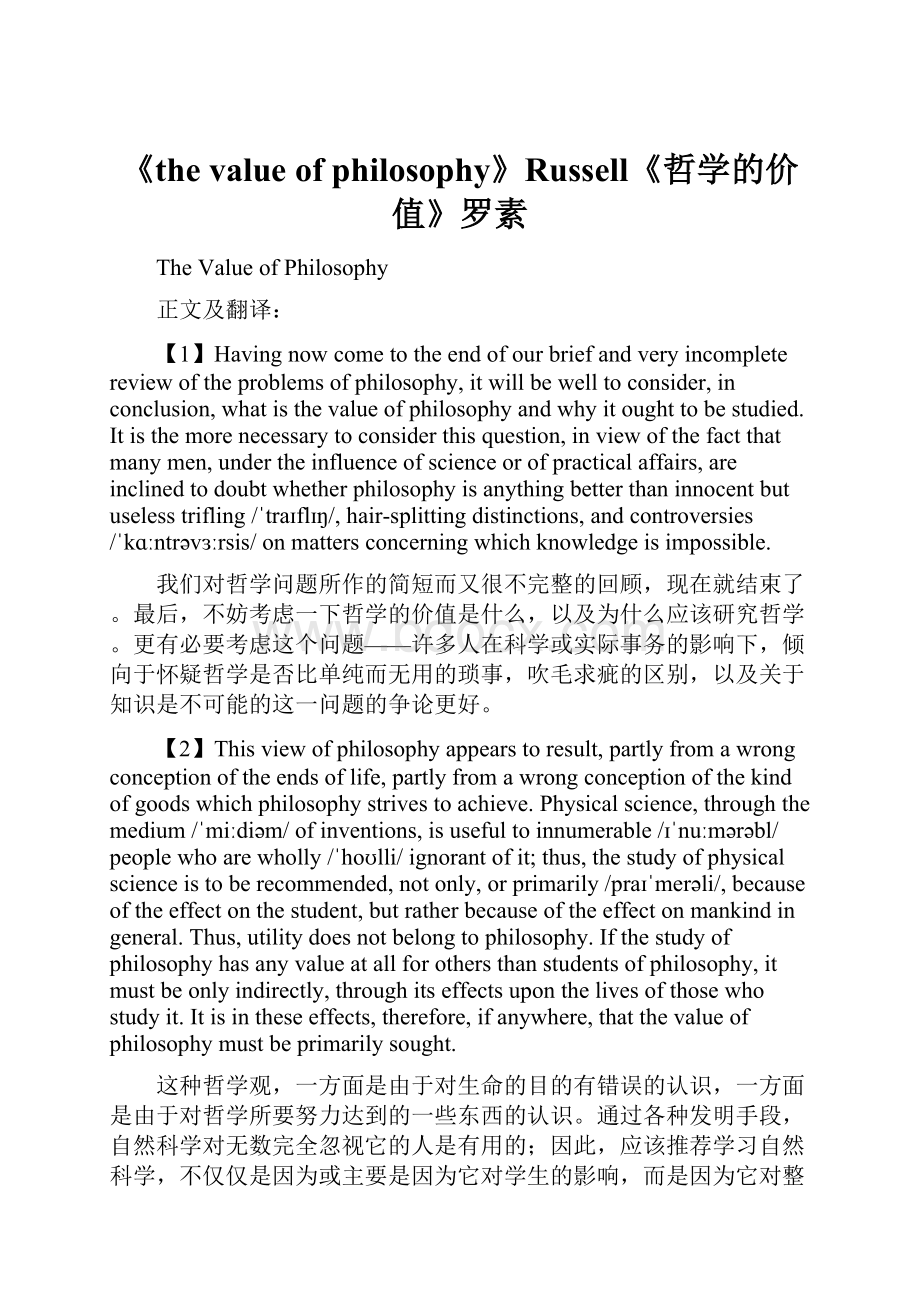《the value of philosophy》Russell《哲学的价值》罗素Word文件下载.docx
《《the value of philosophy》Russell《哲学的价值》罗素Word文件下载.docx》由会员分享,可在线阅读,更多相关《《the value of philosophy》Russell《哲学的价值》罗素Word文件下载.docx(11页珍藏版)》请在冰豆网上搜索。

这种哲学观,一方面是由于对生命的目的有错误的认识,一方面是由于对哲学所要努力达到的一些东西的认识。
通过各种发明手段,自然科学对无数完全忽视它的人是有用的;
因此,应该推荐学习自然科学,不仅仅是因为或主要是因为它对学生的影响,而是因为它对整个人类的影响。
因此,效用不属于哲学。
如果哲学研究对其他人而不是哲学学生有任何价值的话,那也只能是间接的地通过它对那些研究哲学的人的生活的影响(来了解这些)。
因此,哲学的价值,如果要在任何地方寻求的话,就必须首先在这些效果中寻求。
【3】Butfurther,ifwearenottofailinourendeavortodeterminethevalueofphilosophy,wemustfirstfreeourmindsfromtheprejudices/ˈpredʒudɪs/ofwhatarewronglycalled'
practical'
men.The'
man,asthiswordisoftenused,isonewhorecognizesonlymaterialneeds,whorealizesthatmenmusthavefoodforthebody,butisoblivious/əˈblɪviəs/ofthenecessityofprovidingfoodforthemind.Ifallmenwerewelloff,ifpovertyanddiseasehadbeenreducedtotheirlowestpossiblepoint,therewouldstillremainmuchtobedonetoproduceavaluablesociety;
andevenintheexistingworldthegoodsofthemindareatleastasimportantasthegoodsofthebody.Itisexclusively/ɪkˈskluːsɪvli/amongthegoodsofthemindthatthevalueofphilosophyistobefound;
andonlythosewhoarenotindifferenttothesegoodscanbepersuadedthatthestudyofphilosophyisnotawasteoftime.
此外,我们要(想)在努力确定哲学的价值的过程中不失败的话,就必须首先使我们的思想摆脱那些被错误地称为实用主义者的偏见。
‘实际’的人,正如这个词经常被使用的那样,只认识到物质的需要,知道必须有食物供给身体,却忘了供给精神的需要。
如果所有的人都很富裕,如果贫穷和疾病已经减少到他们可能的最低点,仍然有许多工作要做去产生一个有价值的社会;
甚至在现存的世界里,心灵里的东西至少和肉体上的东西一样重要。
哲学的价值,仅仅在精神的货物中才能发现;
只有那些对这些好处并不是漠不关心的人才能被说服——学习哲学不是浪费时间。
【4】Philosophy/fəˈlɑːsəfi/,likeallotherstudies,aimsprimarily/praɪˈmerəli/atknowledge.Theknowledgeitaimsatisthekindofknowledgewhichgivesunityandsystemtothebodyofthesciences,andthekindwhichresultsfromacriticalexaminationofthegroundsofourconvictions,prejudices,andbeliefs.Butitcannotbemaintainedthatphilosophyhashadanyverygreatmeasureofsuccessinitsattemptstoprovidedefinite/ˈdefɪnət/answerstoitsquestions.Ifyouaskamathematician/ˌmæ
θəməˈtɪʃn/,amineralogist/ˌmɪnəˈræ
lədʒɪst/,ahistorian/hɪˈstɔːriən/,oranyothermanoflearning,whatdefinitebodyoftruthshasbeenascertained/æ
sə'
teind/byhisscience,hisanswerwilllastaslongasyouarewillingtolisten.
哲学和其他所有的研究一样,主要是为了知识。
它所追求的知识,是那种使科学具有统一性和系统性的知识,是那种通过对我们的信念、偏见和信仰的理由进行批判性的考察而产生的知识。
但是,不能说哲学在试图为自己的问题提供明确的答案这一方面取得了很大的成功。
如果你问数学家、矿物学家、历史学家或其他任何有学问的人:
他的科学已经确定了什么样的真理——只要你愿意听,他的回答就会一直持续下去。
Butifyouputthesamequestiontoaphilosopher,hewill,ifheiscandid/ˈkæ
ndɪd/,havetoconfess/kənˈfes/thathisstudyhasnotachievedpositiveresultssuchashavebeenachievedbyothersciences.Itistruethatthisispartlyaccountedforbythefactthat,assoonasdefiniteknowledgeconcerninganysubjectbecomespossible,thissubjectceasestobecalledphilosophy,andbecomesaseparatescience.Thewholestudyoftheheavens,whichnowbelongstoastronomy/əˈstrɑːnəmi/,wasonceincludedinphilosophy;
Newton'
sgreatworkwascalled'
themathematicalprinciplesofnatural/ˈnæ
tʃrəl/philosophy'
.
但是,如果你向一个哲学家提出同样的问题,如果他是坦率的,他将不得不承认,他的研究没有取得其他科学所取得的积极成果。
诚然,这部分是由于这样一种事实:
一旦对某一学科有了明确的认识这件事成为可能,这一学科便不再被称为哲学,而成为一门独立的科学。
现在属于天文学的对天空的全部研究,曾经包括在哲学之中;
牛顿的伟大著作被称为“自然哲学的数学原理”。
Similarly,thestudyofthehumanmind,whichwasapartofphilosophy,hasnowbeenseparatedfromphilosophyandhasbecomethescienceofpsychology/saɪˈkɑːlədʒi/.Thus,toagreatextent,theuncertaintyofphilosophyismoreapparentthanreal:
thosequestionswhicharealreadycapableofdefiniteanswersareplacedinthesciences,whilethoseonlytowhich,atpresent,nodefiniteanswercanbegiven,remaintoformtheresidue/ˈrezɪduː/whichiscalledphilosophy.
同样,对人类心理的研究,曾经是哲学的一部分,现在已经从哲学中分离出来,成为心理学的科学。
因此,哲学的不确定性在很大程度上是明显的,而非真实的:
那些已经能够确定答案的问题,就放在科学里,而那些目前还不能确定答案的问题,就剩下了,这就是所谓的哲学。
【5】Thisis,however,onlyapartofthetruthconcerningtheuncertaintyofphilosophy.Therearemanyquestions—andamongthemthosethatareoftheprofoundest/prəˈfaʊnd/interesttoourspiritual/ˈspɪrɪtʃuəl/life—which,sofaraswecansee,mustremaininsoluble/ɪnˈsɑːljəbl/tothehumanintellectunlessitspowersbecomeofquiteadifferentorderfromwhattheyarenow.Hastheuniverseanyunityofplanorpurpose,orisitafortuitous/fɔːˈtjuːɪtəs/concourse/ˈkɑːnkɔːrs/ofatoms/ˈæ
təmz/?
Isconsciousnessapermanentpartoftheuniverse,givinghopeofindefinitegrowthinwisdom,orisitatransitory/ˈtræ
nzətri/accidentonasmallplanetonwhichlifemustultimately/ˈʌltɪmətli/becomeimpossible?
Aregoodandevilofimportancetotheuniverseoronlytoman?
然而,关于哲学的不确定性,这只是真理的一部分。
有许多问题——其中一些问题对我们的精神生活有着深远的意义——据我们所知,这些问题对于人类的智力来说是无法解决的,除非它的力量变得与现在完全不同。
宇宙有任何统一的计划或目的吗?
还是原子的偶然相遇?
意识是宇宙永久的一部分,给了智慧无限增长的希望,还是一个小星球上的短暂的意外(这种生命最终将成为不可能)?
善与恶是对宇宙重要还是只对人类重要?
Suchquestionsareaskedbyphilosophy,andvariouslyansweredbyvariousphilosophers.Butitwouldseemthat,whetheranswersbeotherwisediscoverableornot,theanswerssuggestedbyphilosophyarenoneofthemdemonstrably/dɪˈmɑːnstrəbli/true.Yet,howeverslightmaybethehopeofdiscoveringananswer,itispartofthebusinessofphilosophytocontinuetheconsiderationofsuchquestions,tomakeusawareoftheirimportance,toexaminealltheapproaches/əˈproʊtʃɪz/tothem,andtokeepalivethatspeculative/ˈspekjələtɪv/interestintheuniversewhichisapt/æ
pt/tobekilledbyconfining/kənˈfaɪnɪŋ/ourselvestodefinitelyascertainable/ˌæ
sərˈteɪnəbl/knowledge.
这些问题由哲学提出,并由不同的哲学家作出不同的回答。
但似乎,无论答案是否可以被发现,哲学所提出的答案都没有一个能证明是正确的。
然而,无论找到答案的希望多么渺茫,继续研究这些问题是哲学工作的一部分,使我们认识到它们的重要性,去考察所有解决这些问题的方法,要使我们对宇宙的思辨兴趣继续存在下去,这种兴趣很容易因我们局限于确知的知识而被扼杀。
【补充】Manyphilosophers,itistrue,haveheldthatphilosophycouldestablish/ɪˈstæ
blɪʃ/thetruthofcertainanswerstosuchfundamentalquestions.Theyhavesupposedthatwhatisofmostimportanceinreligiousbeliefscouldbeprovedbystrictdemonstration/ˌdemənˈstreɪʃn/tobetrue.Inordertojudgeofsuchattempts,itisnecessarytotakeasurveyofhumanknowledge,andtoformanopinionastoitsmethodsanditslimitations.Onsuchasubjectitwouldbeunwisetopronounce/prəˈnaʊns/dogmatically/dɔːɡˈmæ
tɪkli/;
butiftheinvestigationsofourpreviouschaptershavenotledusastray/əˈstreɪ/,weshallbecompelledtorenounce/rɪˈnaʊns/thehopeoffindingphilosophical/ˌfɪləˈsɑːfɪkl/proofsofreligiousbeliefs.Wecannot,therefore,includeaspartofthevalueofphilosophyanydefinitesetofanswerstosuchquestions.Hence,oncemore,thevalueofphilosophymustnotdependuponanysupposedbodyofdefinitelyascertainable/ˌæ
sərˈteɪnəbl/knowledgetobeacquiredbythosewhostudyit.
的确,许多哲学家都认为,哲学可以为这些基本问题的某些答案确立真理。
他们认为宗教信仰中最重要的东西可以通过严格的论证来证明是正确的。
为了对这种尝试作出判断,有必要对人类知识进行一次考察,并对其方法和局限性形成一种看法。
在这样一个问题上,武断地发表意见是不明智的;
但是,如果前面几章的考察还没有把我们引入歧途的话,我们就不得不放弃寻找宗教信仰的哲学证据的希望了。
因此,我们不能把对这类问题的一套明确答案作为哲学的价值的一部分。
因此,再一次地,哲学的价值不应依赖于研究它的人所获得的任何假定的可确定的知识。
【6】Thevalueofphilosophyis,infact,tobesoughtlargelyinitsveryuncertainty.Themanwhohasnotincture/ˈtɪŋktʃər/ofphilosophygoesthroughlifeimprisoned/ɪmˈprɪznd/intheprejudicesderived/dɪˈraɪvd/fromcommonsense,fromthehabitual/həˈbɪtʃuəl/beliefsofhisageorhisnation,andfromconvictionswhichhavegrownupinhismindwithouttheco-operationorconsentofhisdeliberatereason.Tosuchamantheworldtendstobecomedefinite/ˈdefɪnət/,finite/ˈfaɪnaɪt/,obvious;
commonobjectsrouse/raʊz/noquestions,andunfamiliarpossibilitiesarecontemptuously/kənˈtemptʃuəsli/<
轻蔑地>
rejected.Assoonaswebegintophilosophize/fəˈlɑːsəfaɪz/,onthecontrary/ˈkɑːntreri/,wefind,aswesawinouropeningchapters,thateventhemosteverydaythingsleadtoproblemstowhichonlyveryincompleteanswerscanbegiven.
事实上,哲学的价值很大程度上在于它的不确定性。
一个不懂哲学的人,他的一生都被囚禁在偏见中(这些偏见来自于常识,来自于他那个时代或国家的习惯性信仰,来自于他头脑中未经其深思熟虑的理性的合作或同意而形成的信念)。
对这样的人来说,世界往往是明确的、有限的、明显的;
普通的事物不会引起质疑,不熟悉的可能性会被轻蔑地拒绝。
相反,我们一开始进行哲学思考,就会发现,就像我们在开篇几章所看到的那样,即使是最日常的事物,也会引起一些只有很不完整的答案才能解决的问题。
Philosophy,thoughunabletotelluswithcertaintywhatisthetrueanswertothedoubtswhichitraises,isabletosuggestmanypossibilities/ˌpɑːsəˈbɪlətis/whichenlargeourthoughtsandfreethemfromthetyranny/ˈtɪrəni/ofcustom.Thus,whilediminishing/dɪˈmɪnɪʃɪŋ/ourfeelingofcertaintyastowhatthingsare,itgreatlyincreasesourknowledgeastowhattheymaybe;
it